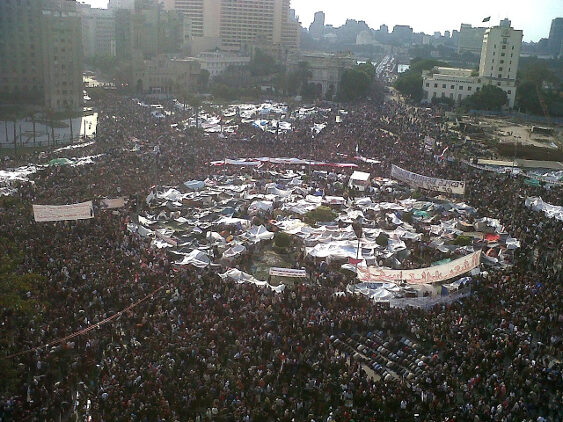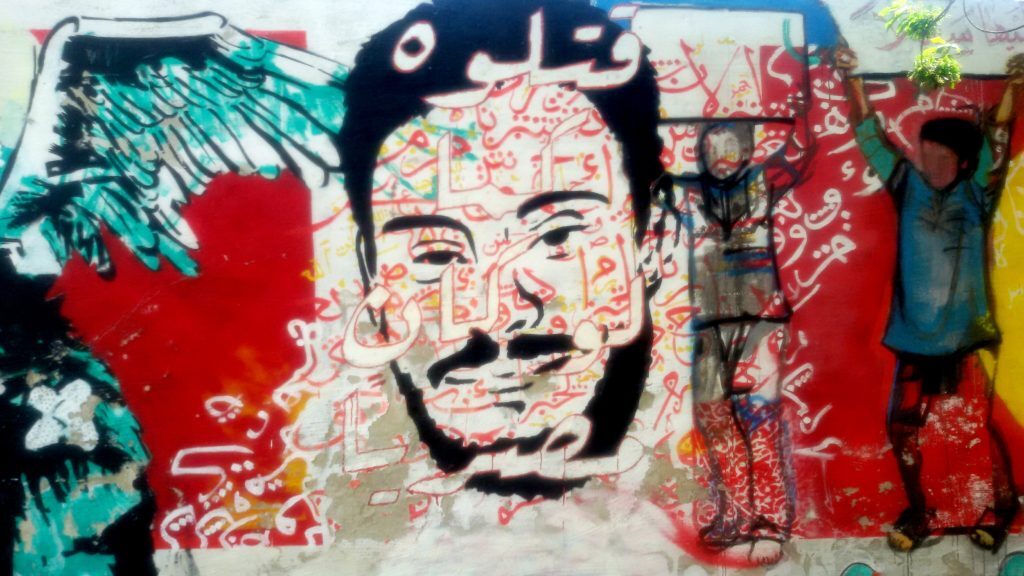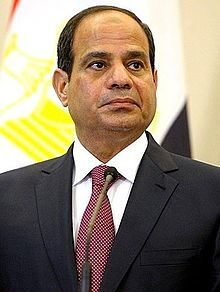THE DEATH OF THE ARAB SPRING IN EGYPT

Tahrir square, Cairo, 2011
The times when we applauded the so-called Arab Spring – because we considered it a fresh breath of democracy for the Arab world – are long past. The Arab Spring began in Tunisia, then spread to Egypt, Syria, Libya and elsewhere, riding the wave of popular demonstrations and revolts which were met with repression by the various threatened regimes. If we were called to take stock of the progress since its beginning in 2011, we would have to say that the result is clearly negative. Exception made for Tunisia – where there was a partial liberalization of the political and social system, albeit at the price of instability – in the rest of the Middle East the situation has remain substantially unchanged. The most glaring example of this is Egypt. Popular uprisings; the toppling of the military regime; the US supporting the rise of the Muslim Brothers; the failure of the latter in leading the country, revealing just how incompatible political Islam and social freedom are; the coup d’etat which reinstated the military regime. A parable where the beginning coincides with the finish line and where the final result is the exact opposite of what was intended: today Egyptians have less freedom than they did in the past and their political system has suffered a further involution. The attempt – failed – to ferry Egypt towards democracy has in fact justified the later military repression. This is obvious when we look at the mock trials against the exponents of the Muslim Brothers; the indiscriminate arrests; the disappearance of many opposers; the tortures; the freedom given to the secret services, as in the case of Giulio Regeni’s brutal murder. The deposed president, Morsi, is undergoing a long trial: he was first sentenced to life in prison for spying on behalf of Qatar, then he was struck with 20 years for the repression of a demonstration in 2012 and is still waiting to be judged for collaborating with foreign powers (in this case Hamas) and for being held in contempt of the court. Morsi and other members of the Brothers, including the Supreme Guide Mohammed Badie, have managed so far to avoid the death penalty thanks to the scrapping of a sentence for the incidents caused during a mass escape attempt from the Wadi al Natroun penitentiary. A gesture of leniency? No, just international pressure.
Yet if Morsi is now in prison, Mubarak is getting out. He was arrested and sentenced to life in prison in 2012. He was then found innocent and absolved from the accusations of murder and corruption. He is now left with a three-year sentence for embezzlement of public moneys which he has already served during the past six years of detention in the Cairo military hospital. Since March 2017, Mubarak lives outside, in his Heliopolis residence.

Berlin mural of Giulio Regeni by El Teneen
The legitimization of power in time General Abdel Fattah Al Sisi is now trying to legitimize his claim to power with a number of actions that should ensure him continuity in time. In February the Egyptian parliament approved a first reading of amendments to the constitution allowing the president to serve two more six-year terms in office. His current mandate expires in 2022 but the amendments give him a chance to remain in his seat until the year 2034. Granted, he will need the sort of popular consensus which we are sure he will find. The presidential elections in 2018 were just the first taste of this consensus, seen that there were no credible alternatives to his rule. Al Sisi is presently 64 years old and he will be able to remain in office until his 79th birthday. After all, Nasser was in power for 24 years, until his death, Sadat reigned for a mere 11 years before being murdered (otherwise he would have continued to reign), and Mubarak was at the helm for almost 30 years before being booted. Egyptian presidential terms seem to depend solely on the ups and downs in the life of the presidents themselves. An overwhelming majority of Al Sisi’s own parliament decided to extend his presidential mandate. Maybe some further amending of the constitution could be approved in time but it seems likely that Al Sisi too is destined to reign for life.
Who’s boss in Egypt
In Egypt, since the times of Nasser, power has been administered by the military hierarchy. The brief stint in the hands of the Muslim Brothers was just an accident in history. The real story is that the military must govern and that the Muslim Brothers are to be imprisoned, persecuted and condemned.
The military lobby also manages the country’s economic resources. It is a State within a State. It controls security and finances. After the ousting of the Muslim Brothers – whose power base was founded on charitable organizations and mosques – there exists no countervailing power that can threaten that of the Egyptian military.

Abdel Fattah el-Sisi
International legitimacy All things considered, the putsch in Egypt should have at least fueled the resentment of the nations that consider democracy and freedom unalienable rights. But this did not happen because of mere conveniency. The conscience of foreign nations were made less sensible by the thought that a stable Egypt in the hands of the Army is better than an unstable mess headed by a group of Islamic orthodox leaders. In the Mid-East, where terrorism develops around religion, a military regimes is way more reassuring than a theocracy. And there are geo-strategic assessments as well: Egypt is a first-rate power in the region and one that’s very useful to have on your side. It’s useful to Israel in their attempt to isolate Gaza and to downsize the Palestinian’s bargaining power. It’s useful because it fights terrorism in the Sinai peninsula. It’s useful to the Palestinians as well, because Egypt is the only mediator between Hamas and the Palestinian National Authority. Even the Sunni countries don’t mind the regime in Egypt, because of the growing Iranian hegemony in the Gulf. In fact, the Gulf monarchies are very generous with the financial problems of Egypt, which in turn offers it’s troops to fight the war in Yemen. It’s useful to the United States as a counterweight to the Iranian and Russian presence in the Middle East and it’s also useful to Libya for its support of Haftar. Relationships with president Obama were not so relaxed but they improved considerably with president Trump whom, differently from his predecessor, is more sensible to convenience and less to principles. Surely Russia sees the Egyptian army as a useful ally in the fight against Islamic terror. Last year the head of the Russian external secret services SVR, Sergej Naryshkin, visited the Cairo where he enacted synergies in intelligence and security sectors with the Egyptians. There is now a tendency for the Egyptian management to side with Moscow, both as an alternative to the sometimes difficult relationship with Washington, and in the light of the fact that the destiny of the Middle East will be in Russian hands in the near future. The support given to Libya’s Haftar is also a product of converging Russian and Egyptian interests. Iran is also favorable to the Egyptian military junta, despite the latter’s connections to Ryadh. Recently the Egyptian minister of Energy visited Teheran to sign contracts with its’ Iranian counterpart. A demonstration of political equilibrium that was well received by the Shia theocracy. Egypt also officially supports Assad in Syria, where they recently sent military observers/instructors (which shows further alignment of Egypt with Russia and Iran). The ousting of Morsi and of the Muslim Brothers and the advent of Al Sisi increased the tension between Egypt and Qatar, Turkey, something which the Saudi’s must have appreciated to no end. But Egypt also plays a central role in Africa, where it mediated between North and South Sudan, one of the many crisis zones across the continent. At any rate – and most importantly – unbiased Egyptian foreign policy is appreciated by the most important nations around the globe.
Useful Egypt
Despite the Egyptian regime being a negative example from the political and social point of view, its role in the region is so important that it overshadows all other considerations. After all, the Middle East is filled with authoritarian regimes without democracy where human rights are systematically violated. If human rights were the meter of international relations, there could be no talks whatsoever with anyone in the region. The criminalization of dissent, limitations and restrictions to freedom of press and assembly, repressive laws that limit the activity of NGOs, the jailing of journalists; all of this bears no importance in the eyes of the international community. The Egyptian regime can do whatever it pleases. The terrorist emergency can justify any kind of restriction and violation of people’s human rights. The rest doesn’t really matter. During a recent meeting between the European Union and the Arab League, Al Sisi was rather explicit with the people who accused him of violating human rights. He said: “We have our own humanity, our own morality and our principles. Please respect them”. 

